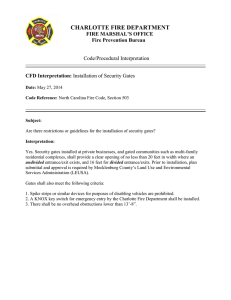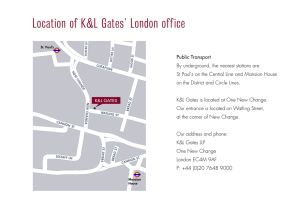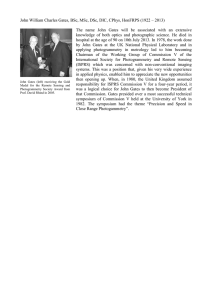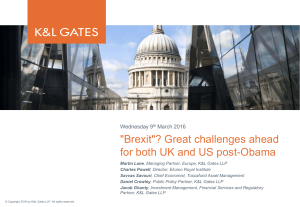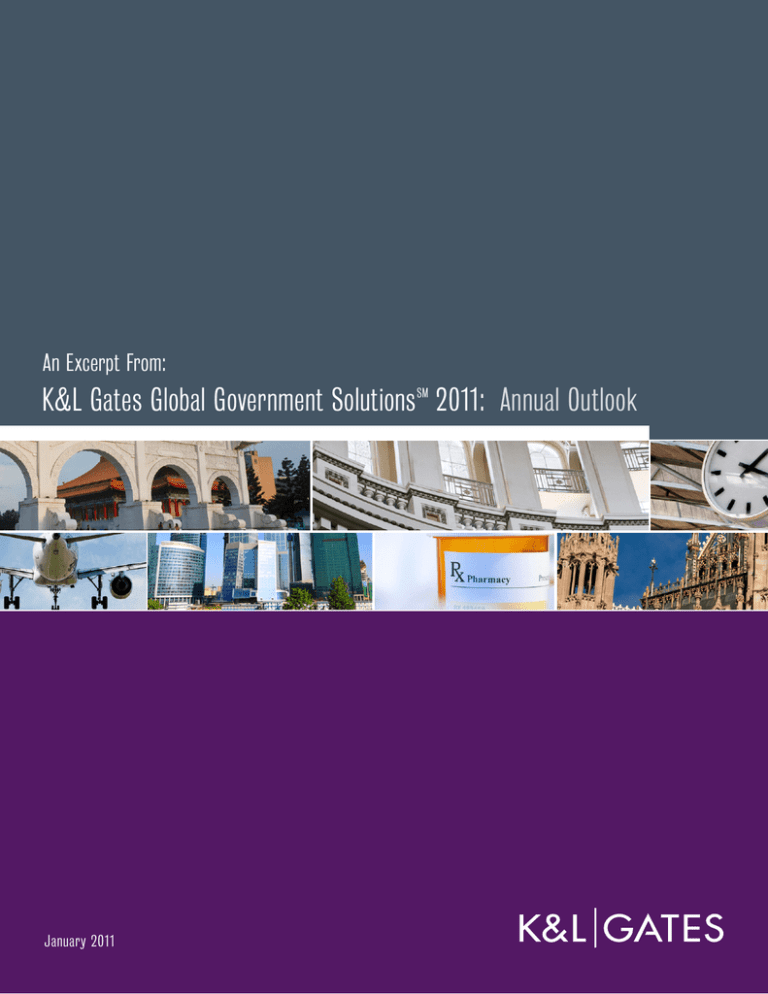
An Excerpt From:
K&L Gates Global Government Solutions SM 2011: Annual Outlook
January 2011
Policy and Politics
Prospects for Passage of Pending Bilateral Free Trade Agreements
During the 2008 presidential campaign, then-candidate Obama expressed
considerable disaffection for the North American Free Trade Agreement
(“NAFTA”), asserting that it had resulted in a loss of U.S. jobs, particularly in the
former industrial heartland states. At the outset of his administration, President
Obama also showed little interest in concluding any of the pending bilateral
trade agreements, including those with South Korea, Colombia, and Panama.
Due to the state of the economy, however, the political and trade policy winds
have shifted, and the administration is now keen to be perceived as pursuing
every available mechanism to promote job growth, including through trade
policy-related initiatives. For example, the administration has announced a new
initiative to streamline export controls, in part to better facilitate exports. The
cornerstone of these efforts, however, has been a push to finalize the bilateral
trade agreements pending at the beginning of this administration, which have
languished for several years. There are three such agreements.
South Korea
In early December 2010, U.S. and
South Korean trade negotiators reached
agreement on the long-delayed U.S.South Korean Free Trade Agreement
(“KORUS FTA”), which had been signed
initially in 2007. Upon approval by
Congress, the KORUS FTA would be
the second largest such arrangement, in
terms of volume of trade, in which the
United States participates, second only to
NAFTA. According to President Obama,
the KORUS FTA will boost annual exports
of automobiles, agricultural products,
and other goods and services by US
$11 billion and support approximately
70,000 jobs in the United States. Access
to the South Korean market for U.S.manufactured automobiles had been
the primary sticking point between the
parties. The revised agreement maintains
the current 2.5 percent U.S. tariff on
South Korean automobile imports until
the fifth year of implementation, while
South Korea’s 8 percent tariff on U.S.
automobile imports will be cut in half
immediately. However, the revised
deal does not address U.S. concerns
regarding restrictions imposed by South
Korea on imports of U.S. beef, which
24
had been imposed in response to the
discovery of “mad cow” disease in U.S.
cattle a number of years ago.
Because the United States negotiated,
concluded, and entered into the KORUS
FTA within the parameters of Trade
Promotion Authority (“TPA”) under the
Bipartisan Trade Promotion Act of 2002
(Pub. L. 107-210), any implementing
legislation should be subject to
expedited procedures, that is, mandatory
congressional consideration, limited
debate, no amendments, and an up-ordown vote.
K&L Gates Global Government Solutions SM 2011 Annual Outlook
Colombia
The U.S.-Colombian Free Trade
Agreement (“CFTA”) was signed on
November 22, 2006 and, like the
KORUS FTA, was negotiated and
entered into under TPA. However,
although implementing legislation for
the CFTA was submitted to Congress in
April 2008, due to alleged procedural
deficiencies the House voted to make
the so-called “fast track” protocol
inapplicable to the implementing
legislation. Democrats in Congress have
balked at approving the agreement until
Colombia takes positive steps to address
a number of lingering issues, most
notably anti-union violence. By contrast,
some policymakers and members of
Congress have touted the progress that
Colombia has made in recent years to
curb violence, and have suggested that
the failure to finalize the agreement with
a crucial ally in Latin America could lead
to further violence in the region.
Panama
The free trade agreement between the
United States and Panama was signed
on June 28, 2007, in time for the
agreement to be considered under TPA
Policy and Politics
Due to the state of the economy, however, the political and
trade policy winds have shifted, and the administration
is now keen to be perceived to be pursuing every
available mechanism to promote job growth, including
through trade policy-related initiatives.
before such authority expired on July 1,
2007. By contrast to the agreements
with South Korea and Colombia, the
Panama agreement is considerably
less controversial, although, at the
behest of Congress, it does contain
provisions relating to enforceable labor
standards, adherence to multilateral
environmental agreements, and easier
access by developing countries to generic
pharmaceuticals that extend beyond
those found in existing bilateral free trade
agreements. Two additional concerns
relate to Panama’s labor statute, which
some members of Congress would like
to see amended to reflect International
Labor Organization guidelines relating
to the formation of unions, as well as
to Panama’s status as a tax haven. The
first of these lingering issues has yet to be
resolved, but on November 30, 2010, the
United States and Panama entered into
a tax information exchange agreement
designed to enable the United States
to more effectively enforce its tax laws,
including by being able to obtain
information relating to bank accounts
in Panama.
Timetables/Steps for Completing
the Agreements.
The Office of the United States Trade
Representative stated in mid-December
2010 that the Obama administration
intends to finalize the legal text of a
supplemental agreement for the KORUS
FTA by late January or early February
2011. However, there remains no
indication as to when the President
might submit the necessary implementing
legislation to Congress, although some
administration officials reportedly expect
that this could occur by the end of
February 2011. Formal submission of
the legislation to the House would trigger
the “fast track” timeline, which requires
a House vote within 60 legislative days,
although there is some question as to
whether the supplemental agreement itself
would qualify for TPA.
In response to assertions by the
incoming House GOP leadership that
the agreements should be addressed
simultaneously by Congress, or in “tight
sequence,” the administration has
stated that there is not yet any timeline
for moving the Colombia and Panama
agreements. House Speaker John Boehner
(R-OH), for example, has stated that he
desires to approve all three pending
trade agreements at about the same time
in 2011, although Rep. Kevin Brady
(R-TX), who was announced on
January 6, 2011 as the House Ways
and Means Trade Subcommittee
chairman, supports passage of all three
agreements in the first half of 2011. On
January 7, 2011, it was reported that
the Republicans serving on the House
Ways and Means Committee intend to
hold a full committee hearing on the three
pending free trade agreements at the end
of January or in early February 2011, at
which U.S. Trade Representative Ron Kirk
likely will be asked to testify.
Jerome J. Zaucha (Washington, D.C.)
jerome.zaucha@klgates.com
Daniel J. Gerkin (Washington, D.C.)
daniel.gerkin@klgates.com
K&L Gates Global Government Solutions SM 2011 Annual Outlook
25
Anchorage
Los Angeles
San Diego
Austin
Miami
Beijing
Berlin
Moscow
San Francisco
Boston
Newark
Seattle
Charlotte
New York
Shanghai
Chicago
Dallas
Orange County
Singapore
Dubai
Palo Alto
Fort Worth
Paris
Spokane/Coeur d’Alene
Frankfurt
Pittsburgh
Taipei
Tokyo
Harrisburg
Portland
Raleigh
Hong Kong
London
Research Triangle Park
Warsaw Washington, D.C.
K&L Gates includes lawyers practicing out of 36 offices located in North America, Europe, Asia and the Middle
East, and represents numerous GLOBAL 500, FORTUNE 100, and FTSE 100 corporations, in addition to growth
and middle market companies, entrepreneurs, capital market participants and public sector entities. For more
information, visit www.klgates.com.
K&L Gates comprises multiple affiliated entities: a limited liability partnership with the full name K&L Gates LLP qualified in Delaware and maintaining offices
throughout the United States, in Berlin and Frankfurt, Germany, in Beijing (K&L Gates LLP Beijing Representative Office), in Dubai, U.A.E., in Shanghai (K&L Gates
LLP Shanghai Representative Office), in Tokyo, and in Singapore; a limited liability partnership (also named K&L Gates LLP) incorporated in England and
maintaining offices in London and Paris; a Taiwan general partnership (K&L Gates) maintaining an office in Taipei; a Hong Kong general partnership (K&L Gates,
Solicitors) maintaining an office in Hong Kong; a Polish limited partnership (K&L Gates Jamka sp.k.) maintaining an office in Warsaw; and a Delaware limited
liability company (K&L Gates Holdings, LLC) maintaining an office in Moscow. K&L Gates maintains appropriate registrations in the jurisdictions in which its offices
are located. A list of the partners or members in each entity is available for inspection at any K&L Gates office.
This publication is for informational purposes and does not contain or convey legal advice. The information herein should not be used or relied upon in regard to
any particular facts or circumstances without first consulting a lawyer.
©2011 K&L Gates LLP. All Rights Reserved.



